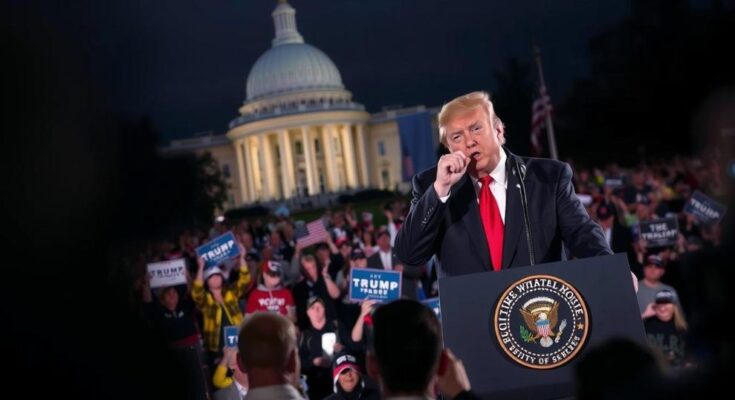During a rally in Lititz, Pennsylvania, former President Donald J. Trump expressed that he ‘shouldn’t have left’ the White House, lamented polling numbers against Vice President Harris, referred to Democrats as ‘demonic,’ and made unsettling jokes about violence toward reporters, reflecting his dissatisfaction with the electoral outcome and ongoing campaign narrative.
On Sunday, former President Donald J. Trump addressed supporters at a rally in Lititz, Pennsylvania, where he expressed regret over having left the White House at the conclusion of his presidential term. During this rally, Mr. Trump articulated his dissatisfaction with public polling data that indicates a decline in his standing against Vice President Kamala Harris. In a troubling jest, he also made comments regarding violence against reporters, which raised eyebrows among observers present at the event. Mr. Trump referred to the Democratic Party as ‘demonic’ and delivered his remarks with a noticeably hoarse voice and a sluggish demeanor. He reiterated his baseless claims concerning election interference, maintaining the narrative that questions the integrity of the electoral process. In claiming the significance of his tenure, he stated, “We had the best border, the safest border,” reflecting on immigration statistics from his administration and citing them as a point of pride as he shared his feelings about his presidency. While discussing the past, Mr. Trump regretfully remarked, “I shouldn’t have left, I mean, honestly,” suggesting that he believed his administration had achieved substantial progress deserving of continuity. His comments mirrored sentiments expressed to close aides after the 2020 election, wherein he reportedly stated, “I’m just not going to leave,” indicating a refusal to accept the election outcome. This rhetoric suggests a lingering unrest regarding his electoral loss and an unwillingness to disengage from the political arena.
In the wake of the contentious 2020 presidential election, former President Donald J. Trump has consistently contested the results, attempting to mobilize his base and influence future electoral prospects. His remarks at the rally not only highlight his dissatisfaction with the election outcome but also demonstrate a recurring pattern of rhetoric targeting his political opponents while echoing sentiments of past grievances. The references to polling and allegations of electoral fraud reflect an ongoing narrative within Mr. Trump’s campaign that seeks to invigorate his supporters leading up to the upcoming elections.
The rally in Pennsylvania underscores former President Trump’s persistent grievances over the 2020 election, showcasing his inclination to suggest continued relevance in the political dialogue. By expressing regret about leaving the White House and making disparaging remarks about his opponents and the press, Mr. Trump positions himself as a figure still engaged and influential within the Republican Party. His statements about the safety of the border and election integrity reveal a strategy to rally his base ahead of future electoral contests.
Original Source: www.nytimes.com




